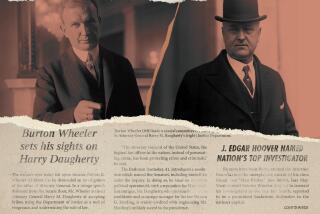Key Events in the Keating Five Case
- Share via
March 12, 1986: The Federal Home Loan Bank in San Francisco begins an examination into Lincoln’s rapid growth and investment activity.
April 9, 1987: Sens. Alan Cranston (D-Calif.), Dennis DeConcini (D-Ariz.), John Glenn (D-Ohio) John McCain (R-Ariz.) and Donald W. Riegle Jr. (D-Mich.), who received large political contributions from Keating, meet with the San Francisco bank examiners.
April 14, 1989: The government takes control of Lincoln at an eventual cost to the taxpayers of $2.6 billion.
Sept. 18, 1990: Keating is indicted on state charges for securities fraud.
Nov. 15, 1990: The Senate Ethics Committee opens hearings into the Keating Five.
Feb. 27, 1991: The Ethics Committee finds “substantial credible evidence” of misconduct by Cranston. It says Riegle and DeConcini gave the appearance of impropriety but recommends no further action against them. Glenn and McCain are criticized less severely. The panel wrestles with what action should be taken against Cranston.
Aug. 2, 1991: Keating’s trial begins in Los Angeles County.
Aug. 5, 1991: Sen. Jesse Helms (R-N.C.), a member of the Ethics Committee, issues a report of his own, saying Cranston should be censured for “reprehensible conduct.”
Nov. 18, 1991: The jury in Los Angeles begins deliberating the Keating case
Nov. 20, 1991: The Ethics Committee reprimands Cranston, who goes before the full Senate and says he will accept the panel’s verdict.
More to Read
Get the L.A. Times Politics newsletter
Deeply reported insights into legislation, politics and policy from Sacramento, Washington and beyond. In your inbox twice per week.
You may occasionally receive promotional content from the Los Angeles Times.










